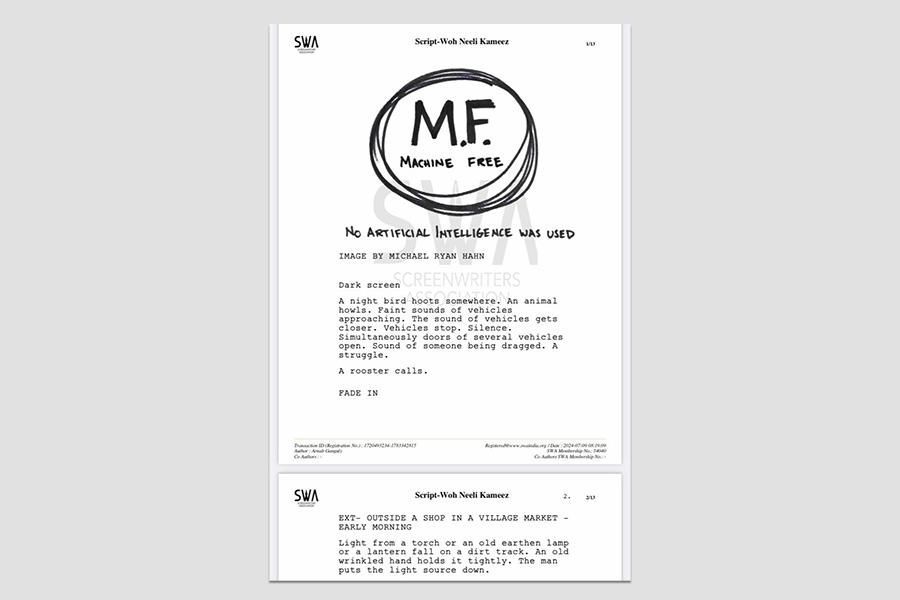After Hindi film lyricists, it’s the turn of the writers’ of story-screenplay-dialogues of Hindi cinema to smile.
The Screenwriters Association (SWA) and the heads of 12 leading production houses have come on the same page to ensure fair credit and monetary compensation for the writers after months of brainstorming.
The deal, principally agreed upon by the producers, follows a similar agreement between the Music Composers Association of India and the SWA regarding lyricists’ credits which was announced last Friday.
Speaking to The Telegraph Online from Mumbai SWA general secretary Zaman Habib expressed confidence on the new terms taking shape in the next two to three months.
“We wanted to ensure even a new writer should get a minimum basic remuneration. We also decided that credit should be given based on contribution rather than seniority,” Zaman said.
He thanked actor-producer Aamir Khan for backing the writers struggling for years against wage gap and inadequate credit.
Twelve leading production houses, streaming platforms, and television channels — Aamir Khan Productions, Yash Raj Films, Red Chillies Entertainment, T-Series, and Amazon Prime Video — began discussions with the SWA last August.
“We were ready with the minimum basic contract and wanted to share it with the producers. Individually, it was difficult to meet all of them. Thankfully, Aamir helped us. He was convinced of what we wanted and arranged a meeting with producers and CEOs from various companies,” Habib said.
The deal was reached after months of negotiations, Habib added.
Seasoned writers like Anjum Rajabali, also the head of SWA’s contract committee, have been complaining about the clauses between the writers and the production houses were heavily skewed in favour of the latter. So much so, in case of any dispute between the writers and the production house, the agreement between the two parties had a clause barring the writer from approaching the SWA for its intervention. In case of any differences the writers did not have the power to terminate the contract.
While many industry professionals have applauded this development, some remain skeptical about its execution. Writer-director Rajeev Barnwal, known for Vadh and Jehanabad: Of Love and War, hailed the move as a “pivotal moment for screenwriters,” while also stressing the importance of proper implementation to bring about lasting change.
“It’s commendable that producers and the big ones in the industry have started recognizing the writers’ effort and contribution to films,” said Barnwal.
The writers would often complain about delay in payments while they were expected to develop loglines and outlines, prepare a synopsis and also work on the screenplay. In many cases since no contract was signed in the initial stages of a project, uncertainty remained over the billing of credit as well.
The SWA and the producers’ have agreed to make a change in the standard practices that has prevailed in the Hindi film industry for decades. They will now receive a share of the credit based on their contribution to the shooting draft. A writer who contributes over 50 per cent to the shooting draft will receive top billing, while those above 66 per cent will secure a solo writing credit. The writer/s name will feature in the top three in a film’s opening credits and promos. In case of a mistake in the credit, the producers have to release a public statement admitting the error and make corrections across all digital versions.
A minimum fee of Rs. 13 lakh has been decided upon for full scripts; Rs. Four lakh each for story development and dialogues, and Rs. Five lakh for screenplay.
Screenwriter Pawan Sony, who has among films and shows, Stree in his writing credits, called it a “major achievement” while underlining proper implementation was crucial. “The SWA has been fighting for this for a long time. This is a great initiative, and I hope it leads to bigger and better things. The legalities are still being worked out, and that’s what truly matters,” he said.
Writer-director Suhrita Das, currently awaiting the release of her film Tu Meri Poori Kahaani, expressed frustration over the long-overdue recognition of writers. “For decades, writers have been treated as mere tools despite being the backbone of storytelling. The real question is—will this agreement truly change anything? Or will writers continue to receive the bare minimum while the industry reaps the benefits of their work?” she asked.
Chintan Sarda, part of the writing team for Amazon Prime Video’s Andhera, echoed these concerns. “Writers have long been undervalued. Fair credit and compensation aren’t just ethical necessities; they are essential for the growth of the industry. Empowered writers create stronger narratives, which in turn elevate cinema and television.”
A clause states that if a writer is proven guilty of sexual harassment, their credit will remain in the film but be removed from promotional materials.
The SWA officials are confident the deal would work in favour of the writers and bring an end to the uncertainty and struggles that has become ingrained in the creative process.
“We are hoping that within 2-3 months, everything will be sorted out. The producers have shown great interest and were happy with the clauses. If any obstacle arises, we will work through it together,” assured Habib.










